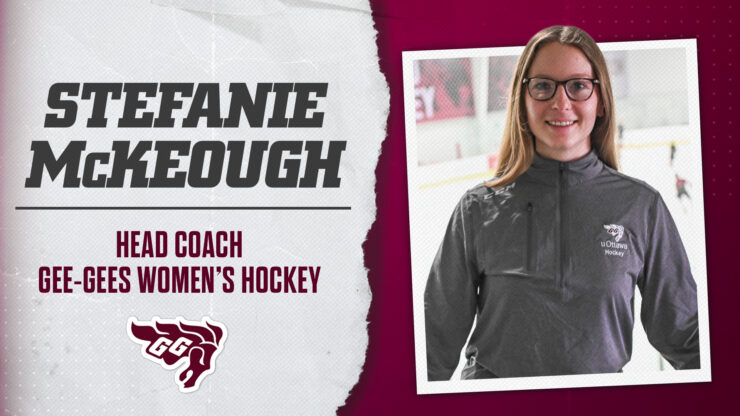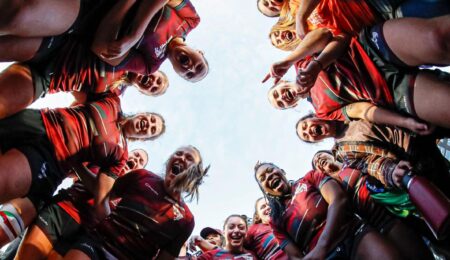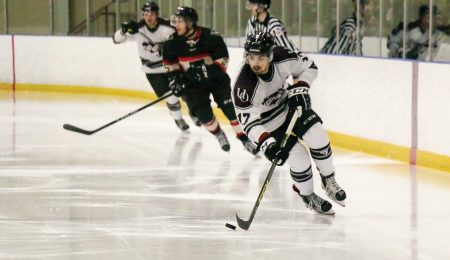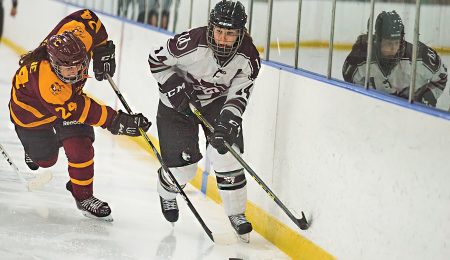“It’s talent that gets you on our radar and it’s character that gets you on our roster”
On July 31st, the Fulcrum spoke with the newly-appointed head coach of the University of Ottawa’s women’s hockey program, Stefanie McKeough. What follows is a transcript of that conversation, lightly edited for readability.
The Fulcrum (F): Hey Stefanie, nice to meet you, and congratulations on your new role.
Stefanie McKeough (SM): Nice meeting you as well! Hopefully, we’re seeing a fair bit of each other this year.
F: Yeah, especially if the team does as well as last year!
SM: No pressure though, right Andrew? (laughs.)
F: Of course. Sometimes it can be a challenge for a coach to go from an assistant role to the head role, maintain who they are, and still be the person the players previously knew. It becomes a little bit different when you become the head coach, a bit of a different dynamic in terms of how relationships go. How do you manage or plan to manage that transition?
SM: I think my view of coaching, no matter what role that I’m at, is that I always view the human first. If a player is a happy healthy human, hopefully, they can be a happy healthy hockey player, and I think that that translates well going from assistant coach to head coach. I think that I took the time over the last two-and-a-half years to build strong relationships with some of the players that are on the team, and then I’ll try to do the same with the new recruits that are coming in. I also think the support of Greg [Bowles], and seeing how other coaches manage these things or having conversations with other coaches in my network about how they’ve managed the transition will help.
F: I want to ask about your team last year – the record of 16-7-2 serves as the most successful season for the program in 16 years, which is pretty awesome! How do you plan on continuing the success found under outgoing coach Chelsea Grills?
SM: I think that every team every year is obviously different with people leaving and people coming in. I think that the biggest thing I’ll take from [Grills] is one of the very first things she said that really stuck with me. I don’t know if she came up with this or heard it somewhere else, but I’ll give her credit for it; she said that obviously, we want to have talented people on our team – but it’s talent that gets you on our radar and it’s character that gets you on our roster. She truly understood the importance of bringing good humans into the program and into a locker room when you need to spend every day with them for ten months. That kind of thing is important, and it wasn’t just something that she said, it was something that she demonstrated. We had the opportunity to sign players who we were really excited about, who on paper could make our team better potentially, but then we do a reference check on them and we find out maybe they’re not the human that we want to have around. I learned a lot from [Grills], and we had a really great time working together, but that’s one of the biggest learnings that I think will hopefully continue to bring success around the rink.
F: You lose the graduating Aurélie Dubuc, but returning goalie Mahika Sarrazin had an incredible season last year, sporting a 7-1 record with a 1.30 goals-against average (GAA). Just how far do you think she can take the team this year?
SM: We were super fortunate with our situation last year – with our goalies we have all the confidence in the world, especially in conjunction with our goalie coach Matt Jenkins. I think [Sarrazin] is only going to get better. One of the best ways I can describe her is something that happened a few years ago, possibly her rookie year. She got scored on by the leading scorer in the country, and as soon as the puck went in the net she just got up and skated right to the top of her crease and was already in her goalie stance, ready for the face-off. It was just like “Okay, no sweat off her back, she’s ready and focused on the next play.” We have Clara Genier coming in who’s a kid with lots of potential, and hopefully, they can have fun challenging each other in practice. We also added Sarah Howell, who’s a local kid and is showing a lot of promise in the summer skates. I’m confident with our trio and I think we’ll benefit from some internal competition this year.
F: Your season kicks off October 13th at home versus [Université de] Montreal. Considering you lost to them in the playoffs last year, how big is the opener going to be for your team?
SM: It’s a new season right, with a new group, but I think there are some moments in hockey that you remember. You remember certain wins a little more and you remember certain losses a little more. I know that game or that 10 seconds or however long it was hasn’t left my brain, so I’m sure it’ll be a similar situation for a lot of the girls. I don’t think that is going to be the focus, but of course, it can be used as a motivator, and as a competitor you don’t want to forget those moments. Hopefully, we can use moments like that to motivate ourselves. The hockey season is a marathon so I’m sure we’ll have many good games against Montreal.
F: Going along with that and considering there are only five teams in your conference that you play all season long, the season is a bit different than what the girls are used to and probably what you’ve been used to in your career. Are there any rivalries that have bred really strong over the past couple of seasons?
SM: I can think of moments against all the teams that have given a little something more to play for. Carleton’s a crosstown rival, what more can I say? McGill, we had that great playoff series against them (2021-22) where half our team had COVID – it was such a battle, and we don’t forget those games. Bishop’s, we’ve had a lot of heated battles against them, and we got to play them during the bronze medal series during that same season. Obviously, we won’t forget Montreal last year. And then Concordia has obviously had a ton of success, being the defending National Champion last year, so you need to bring your “A” game and show what you have against them. We’re super fortunate of the fact that all our games are extremely competitive and it’s any team’s game to win on any given night. It puts a lot of pressure on us when there’s a playoff atmosphere every night.
F: Moving on to your career quickly – your accomplished career, I should say – you’ve won a U-18 silver medal, an NCAA Championship, and were the NCAA WCHA Defensive Player of the Year. What do you look back on as being your favourite accomplishment or your favourite moment in your career?
SM: It’s a hard question. I think honestly, it’s not like one particular moment, it’s always a culmination of things. It’s a lot of times, those moments that you have away from the rink. Obviously winning a national championship is a really cool thing to experience — but when you get to experience it with a group that you’re truly friends with, more like a family, it’s even sweeter. You’re not going to like everybody every single day of the week, but you’re competing and pushing each other and ultimately are working towards the same thing at the end of the day. There are so many great moments I can remember with that group, like team dinners, whether they were planned or not. We would also do community things, like an open skate with the Badgers. We got to play at Camp Randall (Camp Randall Stadium, in front of 55,031 fans), and moments like that were really cool. I think coaching last year with at the U-18s served as a full-circle moment, from playing at them to coaching at them. One of the things that we as a coaching staff always reiterated was to take the downtime to get to know the people on the team because that’s what you’re going to remember. Sure, we won a World Championship this year, but there are so many other moments within that, like joking around on the bench, skating on an outdoor pond that the coaches found. Even just walking around and grabbing a coffee, those moments are just as special.
F: Back to that team at Wisconsin for a second, you get to say you played on a team which boasted one of the best lines ever assembled in women’s hockey, being Meghan Duggan, Hilary Knight, and Brianna Decker. How special was it to play with those sorts of players?
SM: I have two big takeaways from that team, the first I have is that we were always extremely competitive, and when you’re pushing each other every day, you’re going to get better. But the second is how much fun we had. I’m sure that winning helps, but a lot of those games were really close, and when you have high expectations and a ton of pressure on you, it could turn out to not be fun. But I think that we had a lot of really good leadership, and we all made sure that going to the rink was our time, and even though we were competitive and pushed each other, we had fun. At the end of the day, you wouldn’t play hockey and have it take up every day of your life if you weren’t having fun.
F: Is there anything else you wanted to add?
SM: When I was a student, especially being a student-athlete, going to other games was maybe just ingrained in us, but when my other friends would come to games I would get super excited. I know our players are definitely excited to see some other faces in the stands and the games are very good. You’ll see a fast and entertaining game. There’s a lot of skill, I think maybe it gets overlooked how far the skill level has come in the past 10 years. You’re going to see some things that might leave you pretty impressed.
Follow along with the Gee-Gees Women’s Hockey Team this season on Twitter, @GeeGeesWHOC. The schedule has been released, and tickets will be available later this summer.







